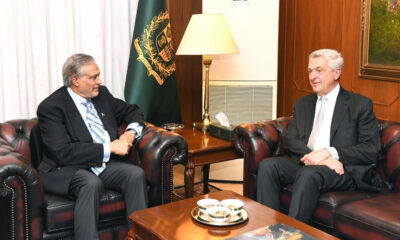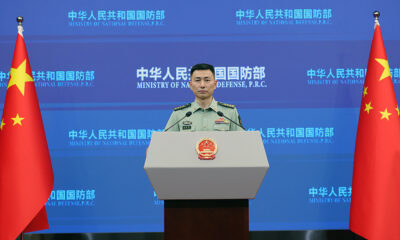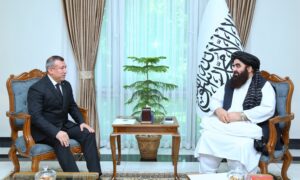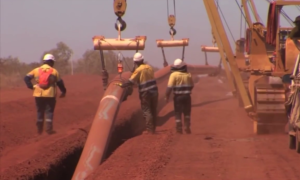Latest News
Taliban seek ‘lion’s share of power’ in deadlocked peace talks: Khalilzad
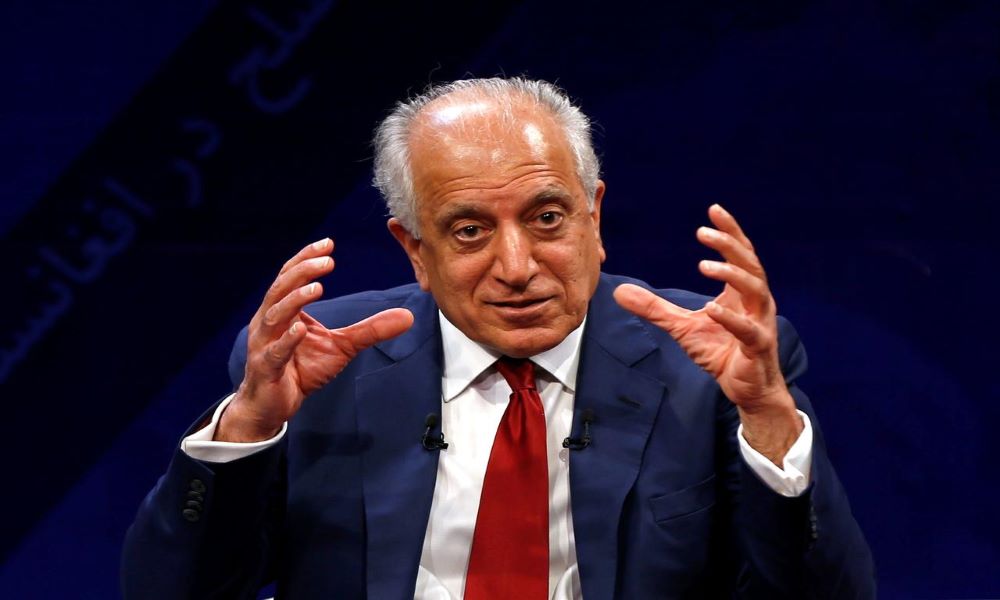
The Taliban and the Kabul government are far apart in U.S.-backed talks on bringing peace to Afghanistan, with the insurgents demanding “the lion’s share of power” in any new government, the special U.S. envoy said on Tuesday.
Afghan-born veteran U.S. diplomat Zalmay Khalilzad’s bleak assessment of the peace process coincides with Taliban advances on provincial capitals that have uprooted tens of thousands of civilians as the U.S. troop pullout nears completion after 20 years of war.
“At this point, they (the Taliban) are demanding that they take the lion’s share of power in the next government given the military situation as they see it,” Khalilzad told the Aspen Security Forum in an online conference.
The deadlocked negotiations in Doha were the subject of a telephone call on Tuesday between U.S. Secretary of State Antony Blinken and Afghan President Ashraf Ghani, with them agreeing on the need accelerate talks, the U.S. State Department said.
Blinken and Ghani also “condemned the ongoing Taliban attacks and displacement of the civilian population,” State Department spokesman Ned Price said in a statement.
The Taliban’s rapid advances have fueled fears that the insurgents aim to re-establish by force their harsh brand of Islamist rule ended by the 2001 U.S.-led invasion, including the repression of women and the independent media.
The insurgents say they want a peace deal.
Price told reporters that the insurgents would become “international pariahs” if they renege on their commitment to the negotiations “and the concern on the part of all of us, one of the many concerns, is that the result will be civil war.”
A car bomb blast followed by sporadic gunfire hit Kabul on Tuesday near the heavily fortified “Green Zone,” leaving three civilians and three attackers dead.
Khalilzad was the architect of the U.S.-Taliban deal for a U.S. troop pullout reached in February 2020.
In his rare public assessment of the Doha talks started under that deal, Khalilzad said peace can only be reached through a ceasefire and negotiations that would establish a transitional government.
Ghani’s administration says the talks should focus on “bringing the Taliban into the current government,” he said.
The Taliban contend that Ghani’s government “is the result of military occupation” and they want an agreement on a transitional government and constitution, Khalilzad continued.
“They are far apart,” he said. “They are trying to affect each other’s calculus and the terms by what they are doing on the battlefield.”
Khalilzad said that 40 years of continuous conflict “has no legitimacy any more.”
“It’s a struggle for a balance of power, dispensation of power between various factions, and no Afghans, especially civilian Afghans, should die because of that,” he added in remarks that risked angering the U.S.-backed Ghani government.
Latest News
US Congress to hold meeting to review situation of Afghan women

The U.S. Congressional Human Rights Commission said in a statement it will hold a meeting on Tuesday this week to review the situation of Afghan women.
This meeting will be held on Tuesday next week with the presence of Rina Amiri, the US special representative for Afghan women’s affairs, Heather Barr, director of the Women’s Rights Division at Human Rights Watch and a number of other Afghan women.
Based on the statement of the commission, the participants of this meeting will review the human rights issues including the situation of women and girls in Afghanistan and provide recommendations for the action of the US Congress.
“Since August 2021, the situation of Afghan women and girls has significantly worsened. A growing list of severe restrictions imposed by the Taliban has severely reduced women’s ability to participate in public life,” the statement read.
This commission also pointed to the prohibition of women from work and denial of access to education, adding that the control over women’s private lives has increased.
Meanwhile, the Islamic Emirate has always rejected concerns about the violation of women’s rights in Afghanistan and emphasized that it is committed to respecting women’s rights in accordance with Islamic Sharia.
Latest News
Pakistan and Turkmenistan agree to fast-track gas pipeline project involving Afghanistan and India
The Turkmenistan-Afghanistan-Pakistan-India (TAPI) pipeline will originate from Galkynysh, the world’s second-biggest gas field, and end at the Indian city of Fazilka near the Pakistan border.
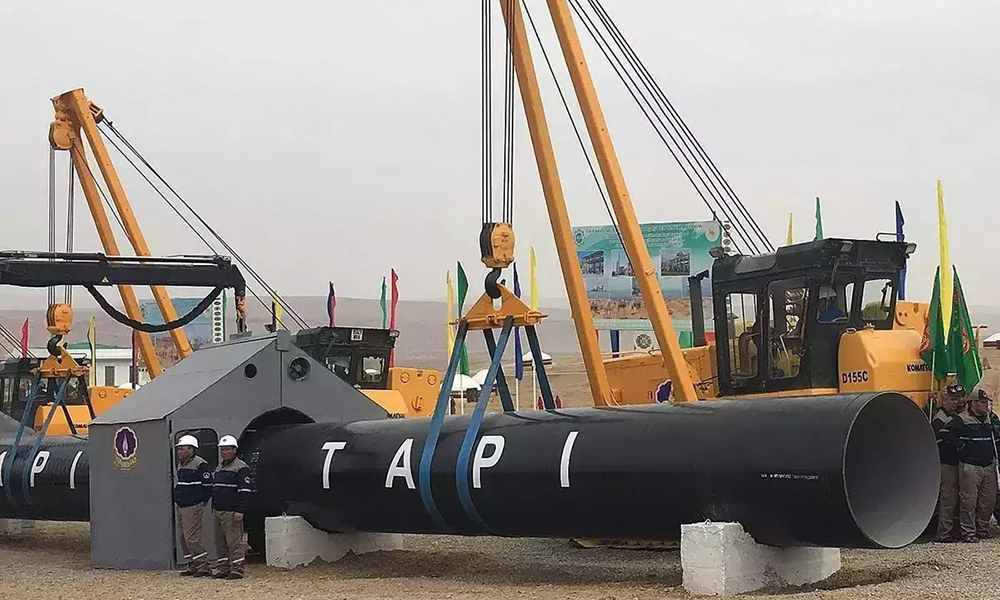
Pakistan and Turkmenistan agreed on Wednesday to fast-track a major pipeline project that will allow the Central Asian state to supply natural gas to Pakistan and India via Afghanistan, thereby enhancing economic activity across the region and benefiting all involved countries.
The understanding between the two states was reached during a meeting between Federal Minister for Petroleum Dr. Musadik Malik and Turkmenistan’s Foreign Affairs Rasit Meredow who arrived on a two-day visit to Islamabad on Tuesday.
The Turkmenistan-Afghanistan-Pakistan-India (TAPI) pipeline will originate from Galkynysh, the world’s second-biggest gas field, and end at the Indian city of Fazilka near the Pakistan border.
If the project is implemented, it will help Turkmenistan supply about 33 billion cubic meters (bcm) of natural gas each year along a route covering a distance of over 1,800 kilometers.
According to an official statement released by the Ministry of Energy’s Petroleum Division, Pakistan and Turkmenistan are working to “expedite” the pipeline project.
“TAPI pipeline project will lower energy costs, which can boost industrial growth, create jobs and foster economic development,” it quoted Pakistan’s petroleum minister as saying during the meeting. “Reliable and affordable energy supplies are vital for industrial sectors and overall economic stability.”
“This project, aimed at fostering economic integration and energy security, has witnessed substantial progress through collaborative efforts,” he continued, stressing the importance of continued engagement between the two countries.
Malik added Pakistan was fully committed to the project which was vital for regional energy cooperation and infrastructure development.
The visiting dignitary expressed appreciation for the warm welcome extended to his delegation by the Pakistani authorities.
“Together we will chalk out a roadmap for cooperation between both countries,” he added.
The meeting was also attended by the CEO of TAPI Pipeline Company Limited.
Other participants of the meeting emphasized the project’s strategic importance in enhancing regional connectivity, promoting economic growth and meeting the energy demands of participating nations.
The TAPI project was envisaged in the early 1990s and officially agreed upon in December 2010.
It has primarily been delayed due to security concerns, geopolitical tensions, funding challenges and bureaucratic hurdles.
Related Stories:
Acting FM discusses TAPI project with Turkmenistan’s envoy in Kabul
Latest News
Pakistan, UNHCR agree on lasting solutions for afghan refugees
The recent attacks and violent demonstrations by Afghani diaspora against Pakistan’s Diplomatic Missions in Frankfurt, London and Brussels also came under discussion, Radio Pakistan reported.
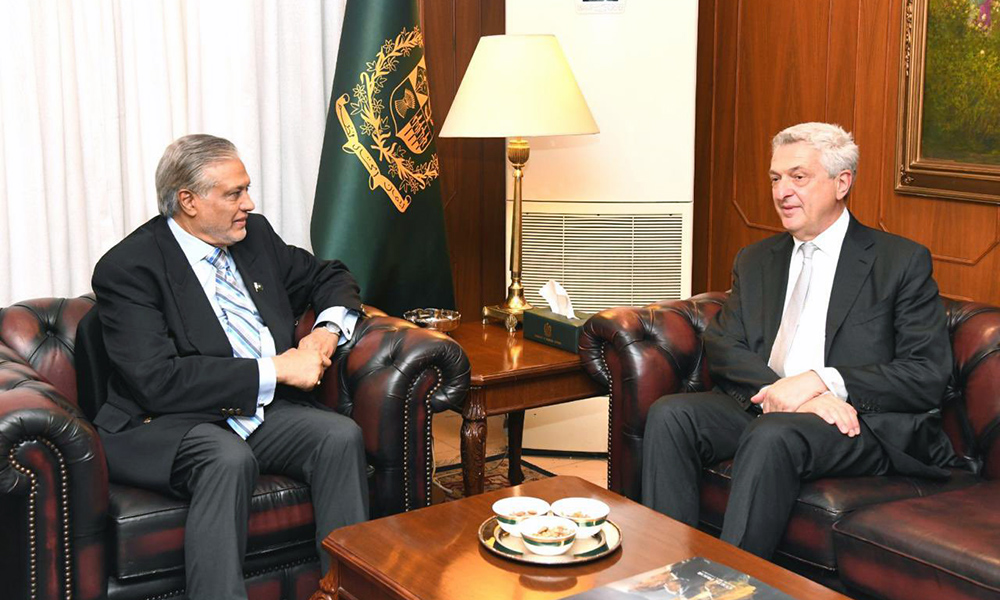
Pakistan’s Deputy Prime Minister and Foreign Minister Mohammad Ishaq Dar on Friday held a telephonic conversation with the United Nations High Commissioner for Refugees Filippo Grandi.
They discussed matters related to Pakistan-UNHCR cooperation.
The recent attacks and violent demonstrations by Afghani diaspora against Pakistan’s Diplomatic Missions in Frankfurt, London and Brussels also came under discussion, Radio Pakistan reported.
The High Commissioner appreciated Pakistan’s traditional hospitality towards Afghan refugees, in particular the recent decision by the Government of Pakistan to extend the validity of Proof of Registration Card.
Deputy Prime Minister and Foreign Minister and the High Commissioner agreed to continue to work together to advance Pakistan-UNHCR cooperation and find lasting solution to the issue of Afghan refugees, read the report.
This comes after the Ministry of Refugees and Repatriation of Afghanistan has announced that Pakistan has extended the POR (Proof of Registration) cards for Afghan refugees for another year.
On Thursday, July 25th, the Ministry reported on X that the Afghan Commissioner for Refugees in Islamabad confirmed the extension of POR cards for Afghan refugees residing in Pakistan. The new validity of these cards is from June 1, 2024, to June 30, 2025.
This extension comes amid rising tensions as the Pakistani government has been deporting over two thousand individuals daily. Despite the extension, Afghan refugees holding POR cards are increasingly concerned about the possibility of forced deportation to Afghanistan.
Related Stories:
Longer-term solutions needed for issue of Afghan refugees in Pakistan: UNHCR chief
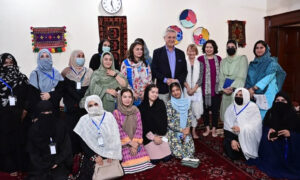
UNHCR chief discusses Afghan refugee issue with Pakistan’s deputy PM
-

 Sport4 days ago
Sport4 days agoOlympics finally here; What you need to know
-

 Latest News5 days ago
Latest News5 days agoOCHA reports 110 die in landmine explosions in Afghanistan every month
-

 Regional5 days ago
Regional5 days agoChina braces for twin tropical cyclones after deadly flash floods
-

 Health4 days ago
Health4 days agoHealth partners provide services 589,205 people in Afghanistan in last month
-

 Latest News4 days ago
Latest News4 days agoAfghanistan’s Hajj ministry confirms death of 27 pilgrims in Mecca and Medina
-

 Business5 days ago
Business5 days agoConference on Islamic microfinance kicks off in Kabul
-

 Sport4 days ago
Sport4 days agoACB proposes ODI fixtures against top-tiered teams
-
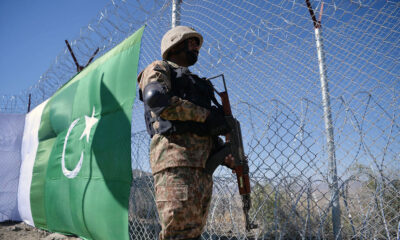
 Latest News4 days ago
Latest News4 days agoIslamabad claims three terrorists killed at Pakistan-Afghanistan border










